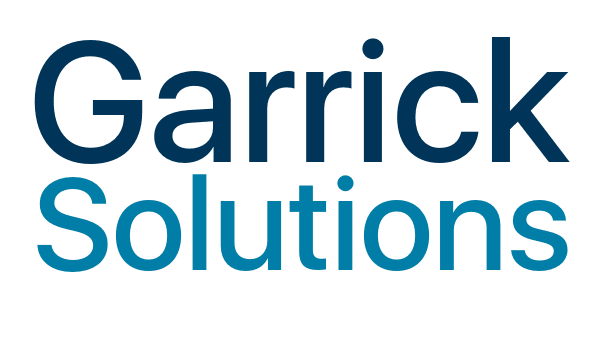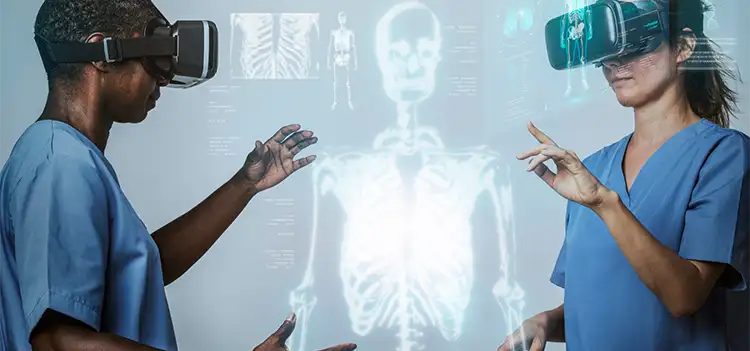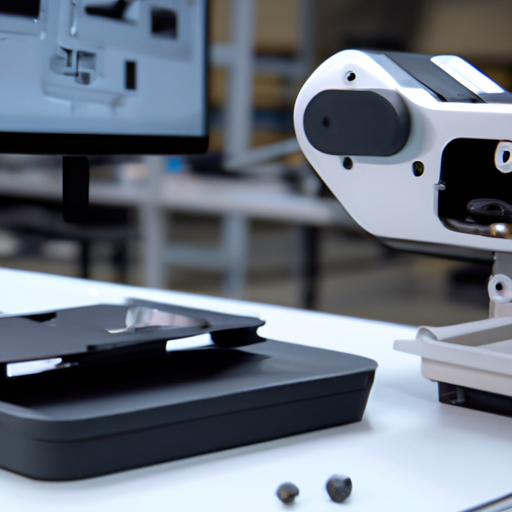
In the ever-evolving world of healthcare, technology continues to push the boundaries of what is possible. One of the most exciting developments in recent years is the integration of Robotic Process Automation (RPA) and Artificial Intelligence (AI) into the healthcare industry. These cutting-edge technologies are revolutionizing the way healthcare organizations operate, enhancing productivity, and decreasing costs. In this article, we will explore the incredible potential of RPA and AI in healthcare and how they are transforming the landscape of patient care. So, buckle up and get ready to dive into a world where robots and AI are improving healthcare outcomes like never before!
With the rise of RPA and AI in healthcare, organizations are finding new ways to streamline their operations and deliver better care to patients. RPA, which involves the use of software robots to automate repetitive tasks, is freeing up valuable time for healthcare professionals, allowing them to focus on what they do best – caring for patients. Meanwhile, AI is revolutionizing diagnostics, treatment planning, and patient monitoring, enabling healthcare providers to make more accurate and efficient decisions. By leveraging the power of RPA and AI, healthcare organizations are not only enhancing productivity but also reducing costs, ultimately leading to better patient outcomes. So, let’s explore the incredible potential of RPA and AI in healthcare and how they are shaping the future of the industry.
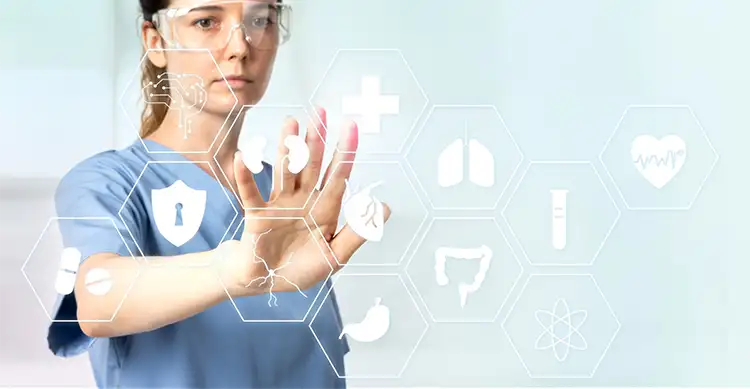
RPA and AI in Healthcare: Enhancing Productivity and Decreasing Costs
In recent years, the healthcare industry has witnessed a significant transformation due to the integration of Robotic Process Automation (RPA) and Artificial Intelligence (AI). These technologies are revolutionizing the way healthcare providers operate, streamlining processes, and reducing costs. RPA and AI have the potential to enhance productivity, improve patient care, and optimize resource allocation.
RPA, a technology that automates repetitive tasks and processes, has found various applications in healthcare. From appointment scheduling to claims processing, RPA can handle administrative tasks efficiently, freeing up healthcare professionals to focus on patient care. By automating these mundane tasks, RPA reduces the chances of human error and improves accuracy. This not only increases productivity but also enhances patient satisfaction.
AI, on the other hand, brings the power of intelligent algorithms and machine learning to healthcare. AI can analyze vast amounts of data, identify patterns, and make predictions, enabling healthcare providers to make informed decisions. For example, AI algorithms can help diagnose diseases, recommend treatment plans, and even predict patient outcomes. This not only improves the accuracy of diagnoses but also ensures that patients receive the most effective and personalized care.
One of the key benefits of integrating RPA and AI in healthcare is the potential for cost savings. By automating tasks that were previously performed manually, healthcare organizations can reduce the need for human resources, leading to significant cost reductions. Moreover, AI-powered predictive analytics can help identify cost-saving opportunities by optimizing resource allocation and streamlining processes. For example, AI algorithms can identify patterns in patient data to predict readmission rates, allowing healthcare providers to intervene early and prevent costly hospital readmissions.
In addition to cost savings, RPA and AI also have the potential to improve patient outcomes. By automating administrative tasks and reducing the chances of errors, healthcare providers can focus more on patient care. This leads to improved patient satisfaction and better overall outcomes. Moreover, AI algorithms can analyze patient data in real-time, allowing healthcare professionals to make timely and informed decisions. This can prevent medical errors, improve treatment plans, and ultimately save lives.
The integration of RPA and AI in healthcare is not without its challenges. One of the main concerns is the ethical implications of using AI in healthcare decision-making. It is important to ensure that AI algorithms are transparent, unbiased, and accountable. Additionally, there is a need for robust data security measures to protect patient privacy. Healthcare organizations must also invest in training their staff to effectively utilize RPA and AI technologies.
In conclusion, the integration of RPA and AI in healthcare has the potential to revolutionize the industry. These technologies enhance productivity, reduce costs, and improve patient outcomes. By automating repetitive tasks and leveraging the power of intelligent algorithms, healthcare providers can focus more on patient care and make informed decisions. However, it is crucial to address the ethical and privacy concerns associated with these technologies. With proper implementation and oversight, RPA and AI can transform healthcare for the better.

Key Takeaways:
- RPA and AI technologies are transforming the healthcare industry by enhancing productivity and reducing costs.
- Robotic Process Automation (RPA) can automate repetitive tasks, freeing up healthcare professionals’ time for more complex and critical tasks.
- Artificial Intelligence (AI) enables healthcare systems to analyze vast amounts of data, leading to improved diagnoses and treatment plans.
- Implementing RPA and AI in healthcare can result in increased efficiency, accuracy, and patient satisfaction.
- By automating processes and utilizing AI algorithms, healthcare organizations can reduce costs and allocate resources more effectively.
Frequently Asked Questions
What is the role of RPA and AI in healthcare?
RPA (Robotic Process Automation) and AI (Artificial Intelligence) play a crucial role in transforming the healthcare industry. RPA automates repetitive and time-consuming tasks, such as data entry and processing, allowing healthcare professionals to focus on more critical patient care activities. AI, on the other hand, analyzes vast amounts of medical data, identifies patterns, and provides valuable insights for diagnosis, treatment, and research.
With RPA and AI, healthcare organizations can streamline administrative processes, reduce errors, and improve operational efficiency. These technologies enable faster and more accurate data analysis, leading to improved clinical decision-making and personalized patient care. Additionally, RPA and AI can help in predicting disease outbreaks, optimizing resource allocation, and enhancing patient safety.
How do RPA and AI enhance productivity in healthcare?
RPA and AI have a significant impact on productivity within the healthcare sector. RPA automates repetitive tasks, such as appointment scheduling, billing, and claims processing, freeing up valuable time for healthcare professionals to focus on patient care. This automation reduces manual errors and ensures greater efficiency in administrative processes.
AI, with its ability to analyze vast amounts of data, enhances productivity by providing valuable insights. It can assist in diagnosing diseases, suggesting treatment plans, and predicting patient outcomes. AI-powered chatbots and virtual assistants can also provide timely and accurate information to patients, reducing the burden on healthcare staff.
By leveraging RPA and AI technologies, healthcare organizations can optimize workflows, improve collaboration between departments, and make data-driven decisions. This ultimately leads to increased productivity and improved patient outcomes.
Can RPA and AI help decrease healthcare costs?
Yes, RPA and AI have the potential to significantly decrease healthcare costs. RPA automates manual and repetitive tasks, reducing the need for human intervention and minimizing errors. This automation improves operational efficiency and saves time, which translates into cost savings for healthcare organizations.
AI, with its ability to analyze vast amounts of data, can identify cost-saving opportunities and optimize resource allocation. For example, AI-powered systems can analyze patient records and identify unnecessary tests or treatments, thus reducing unnecessary expenses. AI can also predict disease outbreaks and optimize the allocation of healthcare resources, resulting in cost savings for healthcare providers.
Furthermore, RPA and AI can help in identifying fraudulent activities, such as insurance fraud or billing errors, which can lead to significant financial savings. By leveraging these technologies, healthcare organizations can achieve cost reductions while maintaining or even improving the quality of care.
What are the challenges of implementing RPA and AI in healthcare?
Implementing RPA and AI in healthcare is not without its challenges. One of the main challenges is the integration of these technologies with existing healthcare systems and processes. Healthcare organizations often have complex and legacy systems that may not be easily compatible with RPA and AI solutions. This integration requires careful planning, customization, and training to ensure a smooth transition.
Another challenge is the ethical and legal implications of using AI in healthcare. AI systems need to comply with privacy regulations and ensure the security of patient data. There is also a need to address concerns regarding transparency, accountability, and bias in AI algorithms, especially when it comes to patient diagnosis and treatment recommendations.
Additionally, there may be resistance to change and fear of job displacement among healthcare professionals. It is important to involve healthcare staff in the implementation process, provide training and support, and emphasize the role of RPA and AI as tools that enhance their work rather than replace them.
What is the future of RPA and AI in healthcare?
The future of RPA and AI in healthcare is promising. These technologies have already shown significant potential in improving patient care, enhancing productivity, and reducing costs. As technology continues to advance, we can expect further innovations and advancements in RPA and AI applications in the healthcare industry.
In the future, RPA and AI are likely to play a more prominent role in clinical decision-making. AI algorithms can analyze vast amounts of patient data and medical literature to provide personalized treatment recommendations. This can lead to more accurate diagnoses, optimized treatment plans, and improved patient outcomes.
Furthermore, the integration of RPA and AI with Internet of Things (IoT) devices can enable remote patient monitoring and early intervention. AI-powered chatbots and virtual assistants may become more sophisticated, providing personalized healthcare guidance and support.
Overall, RPA and AI have the potential to revolutionize healthcare by improving efficiency, reducing costs, and enhancing patient care. As these technologies continue to evolve, we can expect to see more transformative applications in the years to come.
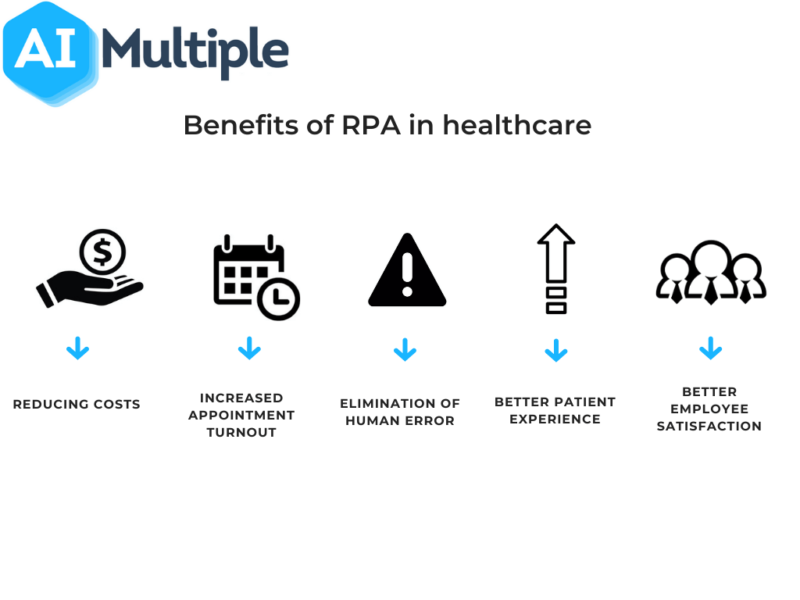
Final Summary: Revolutionizing Healthcare with RPA and AI
In this fast-paced world, where every second matters, the healthcare industry is constantly seeking ways to enhance productivity and decrease costs. RPA (Robotic Process Automation) and AI (Artificial Intelligence) have emerged as game-changers in this pursuit. Through the seamless integration of these technologies, healthcare providers can automate repetitive tasks, streamline processes, and make data-driven decisions, ultimately revolutionizing the way healthcare is delivered.
By harnessing the power of RPA and AI, healthcare organizations can significantly increase their efficiency. Imagine a world where administrative tasks, such as appointment scheduling and medical record management, are effortlessly handled by intelligent software robots. This not only frees up valuable time for healthcare professionals to focus on patient care but also eliminates costly errors and delays. Additionally, AI-powered algorithms can analyze vast amounts of medical data, identifying patterns and trends that can lead to more accurate diagnoses and personalized treatments. This not only improves patient outcomes but also reduces unnecessary tests and procedures, saving both time and money.
The impact of RPA and AI on healthcare goes beyond productivity and cost reduction. These technologies have the potential to transform patient experiences and outcomes. From virtual assistants that provide personalized care recommendations to predictive analytics that detect early signs of diseases, the possibilities are endless. With the aid of RPA and AI, healthcare can become more proactive, preventive, and patient-centered.
In conclusion, the integration of RPA and AI in healthcare is a game-changer. By automating tasks, streamlining processes, and enabling data-driven decision-making, these technologies have the power to enhance productivity and decrease costs in the healthcare industry. Moreover, they have the potential to revolutionize patient experiences and outcomes, making healthcare more efficient, proactive, and personalized. As we continue to embrace the advancements in RPA and AI, the future of healthcare looks promising, empowering both healthcare providers and patients alike.

